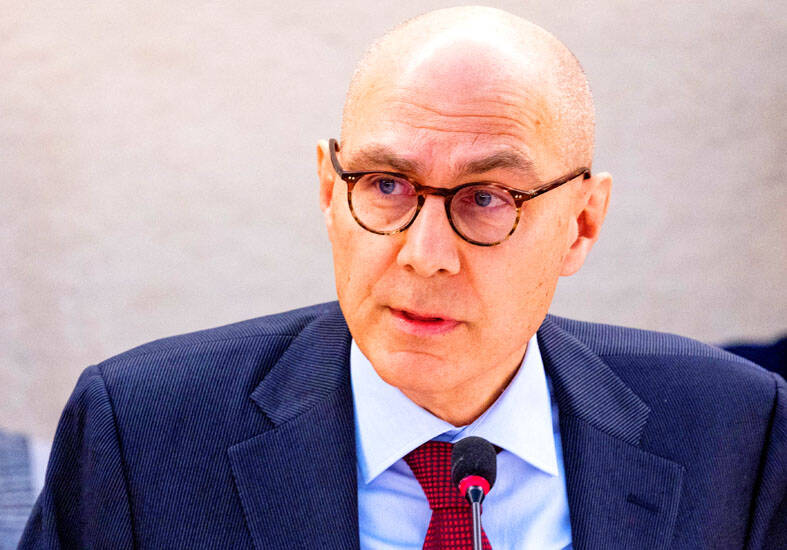At least 26 people were reportedly killed by a gang in three remote villages in Papua New Guinea’s (PNG) north, UN and police officials said yesterday.
“It was a very terrible thing ... when I approached the area, I saw that there were children, men, women. They were killed by a group of 30 young men,” James Baugen, acting Provincial Police Commander in the South Pacific island nation’s East Sepik province, told Australian Broadcasting Corp.
Baugen said that all the houses in the villages had been burned and the remaining villagers were sheltering at a police station, too scared to name the perpetrators.

Photo: Reuters
“Some of the bodies left in the night were taken by crocodiles into the swamp,” he said. “We only saw the place where they were killed.”
“There were heads chopped off,” Baugen said, adding that the attackers were hiding and there were no arrests yet.
UN High Commissioner for Human Rights Volker Turk in a statement on Wednesday said that the attacks happened on Tuesday and Thursday last week.
“I am horrified by the shocking eruption of deadly violence in Papua New Guinea, seemingly as the result of a dispute over land and lake ownership and user rights,” Turk said.
At least 26 people had reportedly died, including 16 children, he said.
“This number could rise to over 50, as local authorities search for missing people,” Turk said.
“In addition, more than 200 villagers fled as their homes were torched,” he said.

Australia has announced an agreement with the tiny Pacific nation Nauru enabling it to send hundreds of immigrants to the barren island. The deal affects more than 220 immigrants in Australia, including some convicted of serious crimes. Australian Minister of Home Affairs Tony Burke signed the memorandum of understanding on a visit to Nauru, the government said in a statement on Friday. “It contains undertakings for the proper treatment and long-term residence of people who have no legal right to stay in Australia, to be received in Nauru,” it said. “Australia will provide funding to underpin this arrangement and support Nauru’s long-term economic

ANGER: Unrest worsened after a taxi driver was killed by a police vehicle on Thursday, as protesters set alight government buildings across the nation Protests worsened overnight across major cities of Indonesia, far beyond the capital, Jakarta, as demonstrators defied Indonesian President Prabowo Subianto’s call for calm. The most serious unrest was seen in the eastern city of Makassar, while protests also unfolded in Bandung, Surabaya, Solo and Yogyakarta. By yesterday morning, crowds had dispersed in Jakarta. Troops patrolled the streets with tactical vehicles and helped civilians clear trash, although smoke was still rising in various protest sites. Three people died and five were injured in Makassar when protesters set fire to the regional parliament building during a plenary session on Friday evening, according to

‘NEO-NAZIS’: A minister described the rally as ‘spreading hate’ and ‘dividing our communities,’ adding that it had been organized and promoted by far-right groups Thousands of Australians joined anti-immigration rallies across the country yesterday that the center-left government condemned, saying they sought to spread hate and were linked to neo-Nazis. “March for Australia” rallies against immigration were held in Sydney, and other state capitals and regional centers, according to the group’s Web site. “Mass migration has torn at the bonds that held our communities together,” the Web site said. The group posted on X on Saturday that the rallies aimed to do “what the mainstream politicians never have the courage to do: demand an end to mass immigration.” The group also said it was concerned about culture,

CRACKDOWN: The Indonesian president vowed to clamp down on ‘treason and terrorism,’ while acceding to some protest demands to revoke lawmaker benefits Protests in Indonesia over rising living costs and inequality intensified overnight, prompting Indonesian President Prabowo Subianto to cancel a planned trip to China, while demonstrators reportedly targeted the homes of the finance minister and several lawmakers. Rioters entered Indonesian Minister of Finance Sri Mulyani Indrawati’s residence near Jakarta early yesterday, but were repelled by armed forces personnel, Kompas reported. Items were taken from the homes of lawmaker Ahmad Sahroni and two others, according to Detik.com. The reports of looting could not be independently verified, and the finance ministry has not responded to requests for comment. The protests were sparked by outrage over